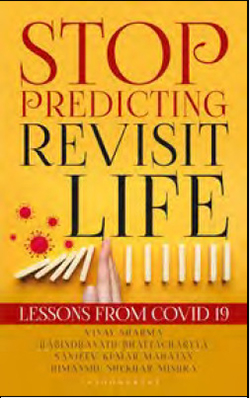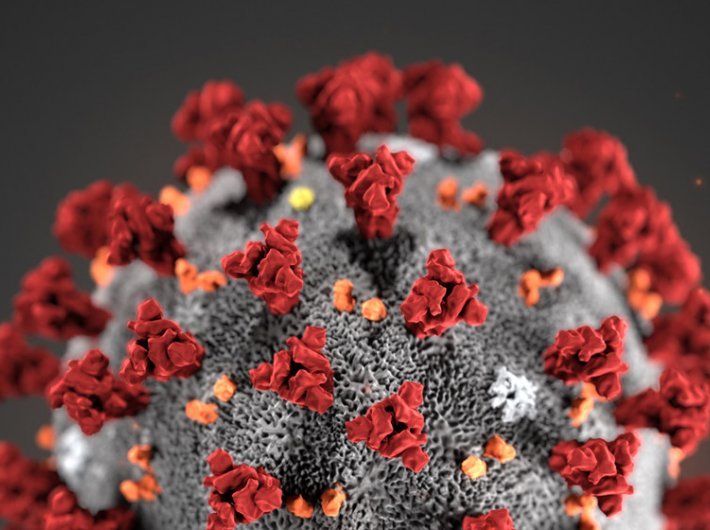‘Stop Predicting, Revisit Life’, a joint work of four researchers, distills what we need to learn from the worst health crisis of our times
Stop Predicting, Revisit Life: Lessons from COVID-19
By Vinay Sharma, Rabindranath Bhattacharyya, Sanjeev Kumar Mahajan, and Himanshu Shekhar Mishra
Bloomsbury, 252 pages, Rs 599
A comprehensive account of how India fought the war against the Covid-19 pandemic, ‘Stop Predicting, Revisit Life’ offers a 360-degree account of the unprecedented health crisis brought on by the pandemic, from the reverse migration of millions of migrant workers to the debilitating impact of a lockdown that led to the biggest annual contraction of the Indian economy since 1952.
It is based on deep analysis of official data and documents released by the government and international institutions, the debates in the parliament, official reports tabled in it and information collected from the ground during the pandemic.
While offering new policy and legislative measures to combat a COVID-19-like pandemic in the future, ‘Stop Predicting, Revisit Life’ explores in detail issues of how we perceive life, what it takes to be resilient and how we can work together as society.
The book has ten chapters – the introduction and the conclusion written jointly while the eight chapters on specific topics written by different co-authors, who include:
Vinay Sharma, a professor at IIT Roorkee, Himanshu Shekhar Mishra, a Senior Editor (Political & Current Affairs) of NDTV India, Sanjeev Kumar Mahajan, Ph.D., a Professor of Public Administration at Himachal Pradesh University, Shimla, and Dr. Rabindranath Bhattacharyya, Professor of Political Science, the University of Burdwan.
Here is an excerpt from the conclusion of the book:
Lessons Learnt
 The pandemic is a hard taskmaster. It taught many lessons that will not be forgotten for generations to come. Both the policymakers as well as civil society learnt how to react/respond/live with an unpredictable situation. We will highlight some of these great lessons while concluding this book.
The pandemic is a hard taskmaster. It taught many lessons that will not be forgotten for generations to come. Both the policymakers as well as civil society learnt how to react/respond/live with an unpredictable situation. We will highlight some of these great lessons while concluding this book.
The first lesson that we have learnt is the need for new legal provisions to deal with the pandemic. One of the examples is the amendment of the century-old Epidemic Diseases Act, 1897, to The Epidemic Diseases (Amendment) Act, 2020 (Gazette of India, notification on 29 September 2020). The powers of the central government to conduct inspection of any ship, bus, train, goods vehicle, vessel or aircraft as well as the detention of any person trying to leave a port during an epidemic was specified. Protection for healthcare personnel and damage to property were also specified in the Act. This has further established a new pandemic protocol at the national level that has put in place a viable policy framework for regulating vaccine production, deployment and nationwide vaccine rollout identifying the beneficiaries. Such a
new legislative response, after developing a national consensus among political parties, state governments and union territories, is critically needed to undertake new institutional steps. These legal provisions will help strengthen India’s medical and healthcare facilities. The new law should also help reform its crisis communication protocol and strengthen the existing public health communication systems on the ground. The new law must outline the blueprint for an outbreak risk communication plan to fight such public health exigencies in the future.
The second major lesson from the pandemic is that the development paradigm on the linear growth model, which focuses on consumerism, may hit social lives hard during a pandemic. The COVID crisis has been a lesson in the basics of well-being in a way that may sustain the lives of the people. The pandemic taught us to look at a larger cost analysis and acknowledge the fact that all the people, be it the leadership or the general masses, should think of prosperity and happiness of the world in a collective manner. It has taught us that development starts with a sustainable interconnection between human beings and nature. It has taught us that catering to linear consumption-based growth may not serve the purpose of development. Policymakers should think about how to avoid disasters and how to maximise peace, happiness and sustainability rather than how to optimise it. It hinges on a fundamental system of well-being which says that there should be access for everyone to food, health, education, decent livelihood, gender equality, clean water and sanitation a pure environment and so on. The pandemic has taught us that the sky is one and so is the sea for all those living on this planet. So clean water, pollution-free air and an ecological equilibrium should be appreciated and protected. They must not be sacrificed at the altar of development. That way, there is also a need to rationalise consumption-based infrastructure currently in use.
On a different plane, this crisis has also reflected the inherent challenges for the marginalised population as well as the community as a whole. A crisis of this proportion calls for us to revisit how we perceive life, what it takes to be resilient and to work together as a society. The pandemic has shown us all that we do not require much for living a reasonably decent life. It has demonstrated that when consumerism reduces, development gets a new meaning by recalibrating demand and supply. The pandemic, in a sense then, has made a positive impact on human well-being by pushing self-aggrandisement to the backburner by giving environment a new lease of life and by encouraging innovation. It has showed that the contingency plan as a ready referral may lose its relevance at any point of time, but that does not mean that negativity has won. Rather, it leads to a certain flexibility and ingenuity.
The third major lesson of this pandemic is the necessity of keeping the social memory alive with perfect storage of historical data. Each country has grappled with biological disasters at some time or the other on a small or large scale. The present pandemic, however, shook the world because we did not learn any lessons from the previous ones, especially from the Spanish flu of 1918. Enough data was not available about the previous pandemics. The agencies need to refurbish themselves to meet the challenges arising out of the current pandemic. Awareness campaigns regarding the ill-effects of the virus and the pandemic need a lot of focus from the government, private organisations, non-profit civil society organisations, research institutions as well as from local authorities. Citizens must also learn to deal with this, so that lives and livelihoods remain protected as much as possible. All will not be the same in a post-COVID world. We will have many changes in our lifestyles as well as community rituals and celebrations. Perhaps the mask will become the new normal for a long time to come. So, the various aspects of such a world-shattering pandemic should be a part of academic curriculums
at various stages.
[Excerpt reproduced with the permission of the publishers.]
